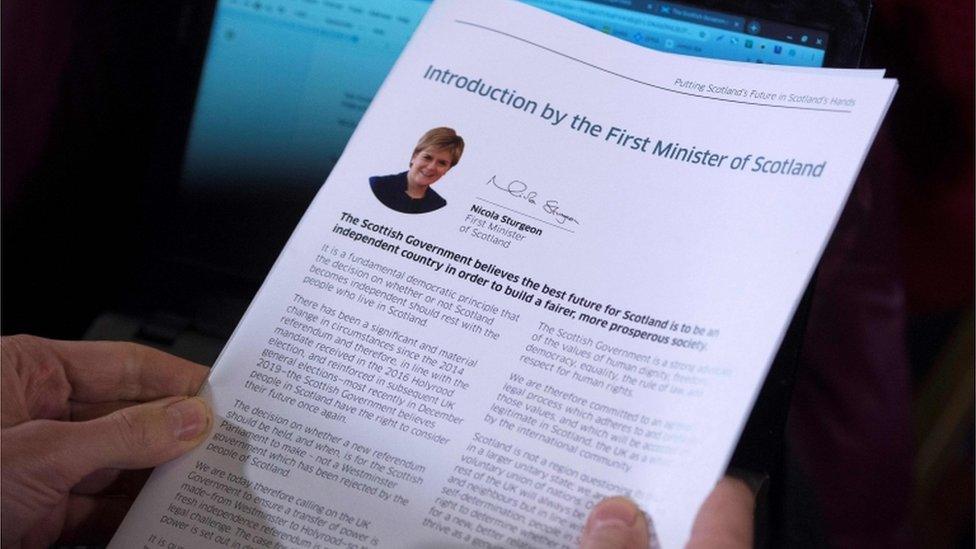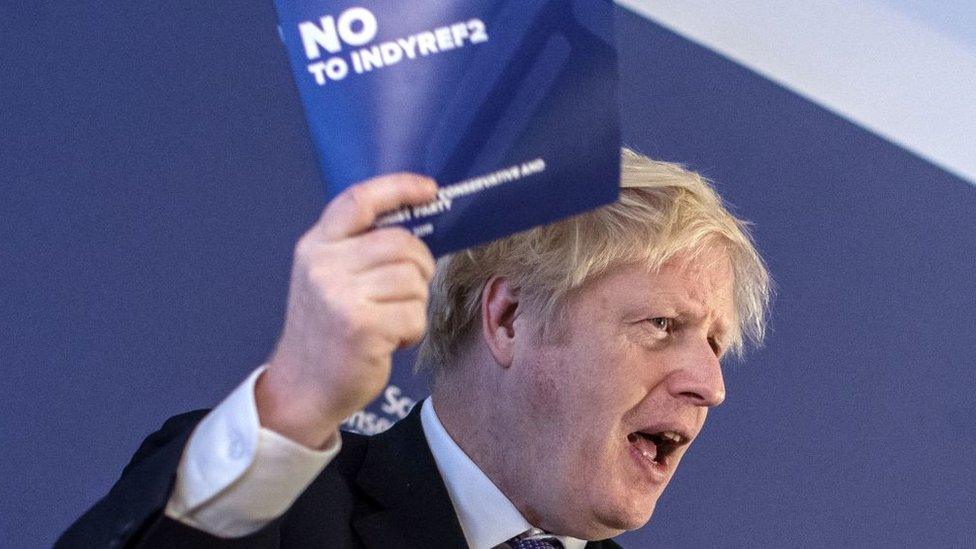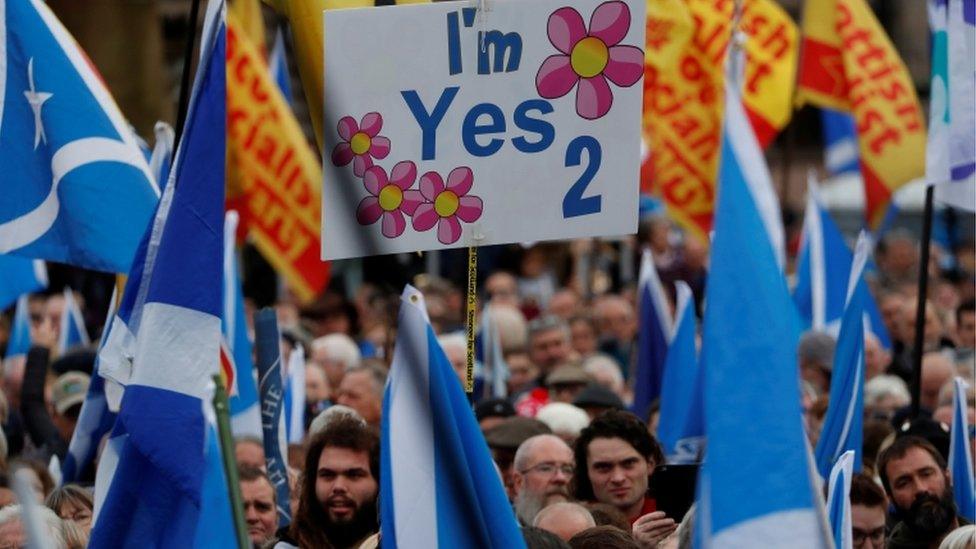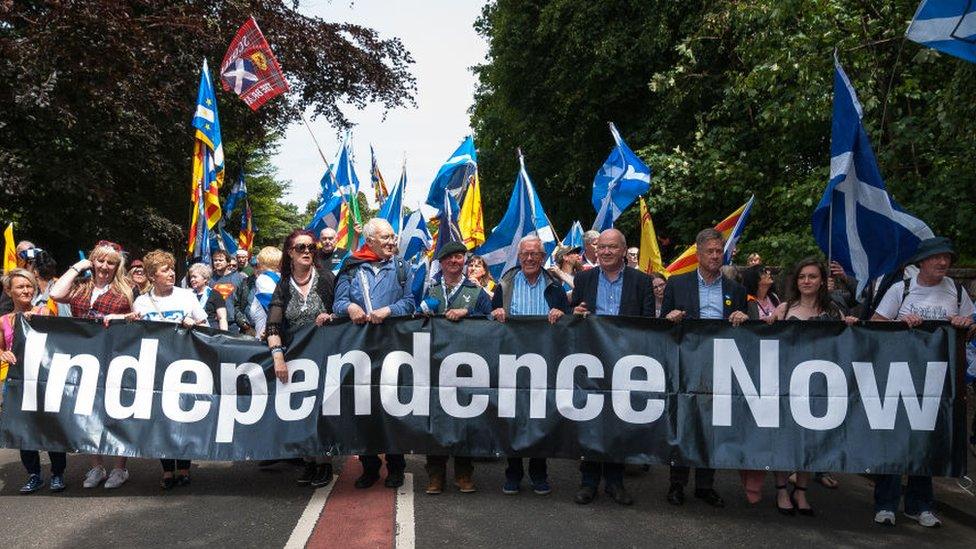Scottish independence: Sturgeon requests powers for referendum
- Published
- comments
Nicola Sturgeon: "We will continue to pursue the democratic case for Scotland's right to choose"
Scotland's first minister has called on the UK government to negotiate a transfer of powers to Holyrood to allow another referendum on independence.
Nicola Sturgeon said there was an "unarguable" mandate for a new vote after her SNP won 48 of Scotland's 59 seats in last week's general election.
A document containing her arguments and draft legislation to transfer powers has been sent to the UK government.
Prime Minister Boris Johnson remains opposed to holding another referendum.
He has argued that the result of the independence referendum in 2014 - when voters backed remaining in the UK by 55% to 45% - should be respected.
And the government used the Queen's Speech at Westminster to say that the "integrity and prosperity" of the UK is of the "utmost importance".
But Ms Sturgeon warned the prime minister that a "flat no" to her request for another referendum would not be the end of the matter.

Ms Sturgeon has published a document outlining her case for another referendum to be held
The first minister says she wants to hold indyref2 in the second half of 2020, and believes the election result has made the case for this "overwhelmingly clear".
But she wants the UK government to agree to a so-called section 30 order, which would give the Scottish Parliament the power to hold a referendum and put its legality beyond doubt - as happened ahead of the 2014 referendum.
And Ms Sturgeon has ruled out the possibility of holding an unofficial referendum similar to the one in Catalonia in 2017.


The argument over Scottish independence will not be settled anytime soon.
Nicola Sturgeon will not stop pursuing her case, no matter how many times she is rebuffed by Westminster.
And she clearly believes that if she keeps arguing that Scotland's democratic voice is being ignored she will build the case in voters' minds not just for another vote, but for independence itself.
The longer she has to wait, the more convinced she is that she will win. She may be asking for a vote before the end of next year, but she is really playing a much longer game.

The pro-independence SNP won a landslide in Scotland in the general election, while the Conservatives lost seven of their 13 seats north of the border despite winning a big majority across the UK as a whole.
Ms Sturgeon has published a paper, external arguing that "consensus is growing by the day" in Scotland for a second referendum, and that there is a "clear mandate for this nation to choose its own future".
In a statement at her official Bute House residence, she said: "We are therefore today calling for the UK government to negotiate and agree the transfer of power that would put beyond doubt the Scottish Parliament's right to legislate for a referendum on independence.
"I anticipate that in the short term we will simply hear a restatement of the UK government's opposition. But they should be under no illusion that this will be an end of the matter."

Ms Sturgeon wants Boris Johnson to agree to hold a new referendum - but the prime minister "remains opposed"
The paper published by Ms Sturgeon includes draft legislation which would give Holyrood the power to call referendums, although she said she was open to negotiations about the details of how this would work.
She said: "It is a fundamental democratic principle that decisions on Scotland's constitutional future should rest with the people who live here.
"The Scottish government has a clear democratic mandate to offer people a choice on that future in an independence referendum, and the UK government has a democratic duty to recognise that.
"The mandate we have to offer the Scottish people a choice over their future is, by any normal standard of democracy, unarguable."
And in a letter to the prime minister, Ms Sturgeon said Mr Johnson had "committed to engaging seriously with our proposals" in their telephone conversation last Friday.
She added: "I believe that on this - as on any issue - you have a duty to do so in a considered and reasonable manner. I therefore look forward to discussing matters further with you in the New Year.
The move comes on the same day as the devolved Scottish Parliament passed legislation that could help pave the way to a referendum, external.
The Referendums (Scotland) Bill passed on Thursday afternoon with the backing of the SNP and Scottish Greens, although Holyrood's three pro-union parties - the Conservatives, Labour and the Lib Dems - voted against it.
The legislation sets the general rules for any referendum, but a separate bill would need to be passed for any new independence ballot.

A series of pro-independence rallies have been held across Scotland in recent months
While the polls have narrowed in recent months, they still generally give a slender lead, external to the pro-UK side.
The Conservative election campaign in Scotland was centred on opposition to independence and a referendum, and the prime minister told Ms Sturgeon in a telephone conversation last week that he "remains opposed" to a new vote.
Michael Gove, the Chancellor of the Duchy of Lancaster, said Ms Sturgeon and the SNP "should concentrate on improving Scotland's hospitals and schools rather than trying to re-run an independence referendum they promised would be a once in a generation event".
Mr Gove added: "I think on that basis we should respect the referendum result and politicians across the United Kingdom should be concentrating on the issues that really matter to people: improving the NHS, fighting crime and helping to improve education.
'The Scottish government have a lot on their plate. My friends and family in Scotland want them to concentrate on improving the NHS, making sure Scottish schools are better. I want to work with the Scottish government to make sure that Scottish people's lives are better."
But his colleague Andrew Mitchell, a Conservative MP and former government minister under David Cameron, told the BBC it would be "extremely difficult" for the prime minister to continue to "resist the strong argument" for people to have another vote on independence,
He added: "I think it will stand for now, and I think it will stand until the end of the Brexit process and the new settlement is clear. They can resist it for a bit, but it would not be possible to resist it forever."
- Published19 December 2019
